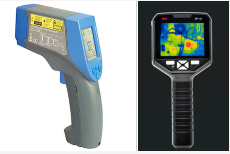What’s the difference between infrared thermometer and thermal camera?
Infrared thermometer and thermal camera has five main differences:
 1. The infrared thermometer measures the average temperature in a circular area, and the infrared thermal camera measures the temperature distribution on a surface;
1. The infrared thermometer measures the average temperature in a circular area, and the infrared thermal camera measures the temperature distribution on a surface;
2. Infrared thermometers cannot display visible light images, and infrared thermal imaging cameras can take visible light images like a camera;
3. Infrared thermometer cannot generate infrared thermal images, while infrared thermal imaging cameras can generate infrared thermal images in real time;
4. The infrared thermometer has no data storage function, and the infrared thermal imager can store and annotate data;
5. The infrared thermometer has no output function, but infrared thermal imager has an output function. Specifically, compared with infrared thermometers, infrared thermal imaging cameras have four core advantages: safety, intuitiveness, high efficiency, and prevention of missed detection.
The infrared thermometer only has a single-point measurement function, while the infrared thermal imager can capture the overall temperature distribution of the measured target, and quickly find high and low temperature points, thereby avoiding missed detection.
For example, when testing a 1-meter-high electrical cabinet, the engineer needs to scan back and forth repeatedly for at least several minutes, for fear of missing a certain high temperature and causing a safety hazard. However, with thermal imaging camera, it can be completed in a few seconds, and the most important thing is that it is clear at a glance, absolutely nothing is missed.
Secondly, although the infrared thermometer has a laser pointer, it only acts as a reminder of the measured target. It is not equal to the measured temperature point, but the average temperature in the corresponding target area. However, most users will mistakenly think that the displayed temperature value is the temperature of the laser point, but it is not!
The infrared thermal camera does not have this problem, because it shows the overall temperature distribution, which is clear at a glance, and many infrared thermal imagers on the market are equipped with laser pointers and LED lights, which are convenient for quick location and identification on site. For some detection environments with safety distance restrictions, ordinary infrared thermometers cannot meet the demand, because as the measurement distance increases, that is, the target area for accurate detection is expanded, and the naturally obtained temperature value will be affected. However, infrared thermal imaging cameras can provide accurate measurements from a safe distance from the user, because the D:S distance coefficient of 300:1 far exceeds that of infrared thermometers.
Finally, for the recording and analysis of data, the infrared thermometer does not have such a function, and it can only be recorded manually, which cannot be effectively managed. The infrared camera can automatically save visible light images while shooting for later comparison.
Post time: Dec-26-2022

